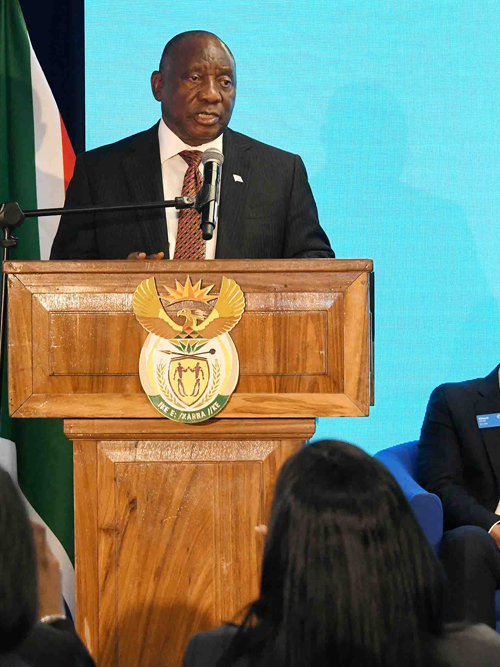As-Salaam Alaykum! (May peace be upon you!)
Programme Director;
Minister Ebrahim Patel;
President of the MJC, Mr Sheikh Riad Fataar and your Executive;
Turkish Consulate General, Mr Sinan;
Our Esteemed Religious and Inter-Faith Leaders here Present;
Business leaders;
Charity and Educational Organisations
Distinguished Guests;
Brothers and Sisters,
On behalf of Government and the people of South Africa, I would like to wish all our Muslim brothers and sisters here at home, the wider African continent, and the world a blessed month of Ramadan as we join you to witness IFTAAR and the breaking of the fast-boeka.
We are deeply honoured by your invitation to come to share this special occasion because it is in line with my delegated responsibility as Deputy President, which is to promote activities that foster social cohesion and nation-building throughout all sectors of South African society.
This is also in line with Pillar 5 of the National Development Plan on Nation-Building, which is aimed at "Fostering social compacts for partnerships with civil society, the private sector, and citizens for a more democratic, equal, and prosperous society, laying the basis for inclusion, equity, and prosperity for all."
It is for this reason that when I assumed my duties as the Deputy President of the Republic, one of the first tasks given to me by the President was to facilitate dialogue and foster social compacts with key sectors of our society, including faith-based institutions and communities, to promote nation-building initiatives across South Africa.
It was therefore no surprise that one of our first engagements after taking office was the Inter-Faith IFTAAR and Breaking of the Fast of Ramadan, here in Cape Town, at the Gatesville Masjidul-Quds Mosque in April last year.
Once more, we have gathered here today to share meals in a spirit of unity, understanding, and friendship with members of various faith communities.
As we have gathered, we should also be aware that April is a very important month in our country's calendar because it marks Freedom Month as well as an incredible milestone of 30 years of democracy.
Therefore, this month offers us an opportunity to reflect on the progress made thus far in transforming our society while also examining our challenges. Although we have made great strides since 1994, inequality, poverty, and unemployment remain major obstacles to South Africa's national unity and social cohesion.
We should be in one accord in addressing the remaining challenges that threaten our society's social fabric. We should unite as we did when we fought apartheid, and when we as political leaders stray from our objectives, you as religious leaders should steer us in the right direction to make our country better.
Muslims have played an important role in shaping South Africa's history, a role that has continued to this day. We urge you to follow in the footsteps of our previous generations of liberators, such as Nelson Mandela, Oliver Tambo, Abdul Burns, Walter Sisulu, Dr Alan Boesak and Imam Hassan Solomon, who led protest marches armed with the Bible and the Quran in hand.
They fought selflessly for the freedom we have today. Let us reciprocate our forefathers' selflessness with kindness and humility and replicate their spirit of fighting for the good of others.
Let us do good deeds to improve another’s health and wellbeing.
Let us do good to provide shelter and a meal to the homeless.
Let us do good by keeping young people out of the streets and providing them with quality education.
Ladies and Gentlemen,
Let me commend the leadership of the Muslim Judicial Council South Africa for their excellent dedication to education in our community by offering excellent education in their schools. By prioritising skills development, you empower people and provide them the opportunity to make important contributions to our country.
Furthermore, by promoting social cohesion, you lay the groundwork for a society in which mutual respect and understanding serve as the foundation for all relationships.
However, the effects of such interfaith collaboration go beyond the immediate advantages of enhanced understanding and respect. They stand as a symbol of our collective values, and demonstrate the power that comes from our interconnectedness.
In this regard, we urge all other religious communities to engage in charitable work and community service, benefiting not only their members but also society as a whole.
We must unite as a society to help the less fortunate, support those in need, and foster a culture of compassion and generosity. These acts of service promote inclusion and caring communities. Through such religious communities, we are also able to instil moral values such as forgiveness and respect for others, therefore strengthening our moral compass.
We urge the Muslim community to continue to advocate for social justice and human rights and to lead movements for equality, dignity, and freedom, empowering people to speak out against injustices and fight towards a more equitable world order.
May we use the breaking of this fast as an opportunity to remember those whose rights have been undermined, including the rights of the Palestinian people.
Ladies and Gentlemen,
I must reaffirm South Africa’s stance which condemns Israel’s attack on Palestinian civilians. Our message to Israel will never change; we have taken a position and will forever speak out against the violence towards the people of Palestine. As we break bread, it is important to keep in mind those who are suffering due to extreme hunger from such heartless acts.
We are aware that there are individuals who view support for the State of Israel as both an ideological and, in certain cases, a religious issue. It seems that no matter the facts presented or how persuasive the argument is, they remain steadfast and unpersuaded.
However, we find comfort in the solidarity many of you, including Muslim community leaders, have shown for the Palestinians. As a country, we will continue to pledge our solidarity with the people of Palestine in their struggle to end all acts of apartheid by the Israeli government and the genocide emanating from that evil system, while supporting their collective right to self-determination.
We should never allow the Israel-Palestine conflict to divide us as a nation. The ANC-led government is committed to fostering open dialogue and collaboration with all sectors of our society, particularly on issues that may be divisive or controversial.
We are committed to promoting social cohesion, which entails accepting diversity, striving for a shared understanding, and developing a workable plan for positive social transformation.
We are steadfast in our dedication to advancing the Bill of Rights, which serves as a cornerstone, protecting the rights of all individuals in our nation, and upholding the democratic principles of human dignity, equality, and freedom.
In South Africa, the path to unity and understanding has been a long one, and at times, it has not been an easy journey. However, our shared commitment to the ideals of democracy, equality, and Ubuntu have been our guiding light.
As we gather here during this blessed month, we should take the time to reflect on the role that religious communities play in nation-building by encouraging social cohesion, promoting unity, and upholding values that guide individuals towards our common goals.
In the heart of our nation, the role of interfaith collaboration emerges as a foundational pillar in the architecture of our collective identity. Occasions like tonight's interfaith IFTAAR dinner are not a mere gathering; they are also a powerful expression of our nation's soul, a vibrant tapestry made from the many different colours of our multicultural and religious history.
They are manifestations of our collective yearning to create a South Africa defined by its inclusivity, where every individual and community, regardless of their faith or background, feels an intrinsic part of the national fabric.
These events demonstrate the potential of interfaith dialogue to unite the nation. Sitting together, sharing a meal, and having respectful conversations demonstrates our resilience and unity as a nation.
It is through these dialogues that we find common ground, understanding that our differences do not divide us but rather enrich our collective experience.
Brothers and Sisters,
In the spirit of unity and shared progress, I encourage each section of our diverse society to widen its embrace, bridging the gaps that have historically separated us. Ramadan teaches us important lessons on empathy, generosity, and a sense of community—principles that should not be confined to a single month but rather integrated into our daily lives.
I encourage every South African to actively participate in acts of kindness, volunteer their time and resources towards uplifting communities, and promoting social cohesion.
Imagine what an enormous shift we could achieve if each person took a step towards understanding their neighbours, appreciating our nation's rich traditions, and discovering our shared values.
Such efforts will build empathy and respect while tearing down misconceptions. This approach follows the notion of Ubuntu, which emphasises our interdependence: "I am because you are." It recognises the connection between my well-being and yours in the shared pursuit of a harmonious society.
In closing, let me express my deepest respect for the holy month of Ramadan and its profound teachings. Let the spirit of Ramadan inspire us to renew our commitment to each other, to our nation's ideals, and to the universal values that connect us all.
Together, we can build a more unified, peaceful, and vibrant South Africa, a nation that truly reflects the rich diversity and boundless potential of its people.
Happy Ramadan to all of our Muslim brothers and sisters! May peace and prosperity bless our beautiful nation!
Shuk-ran-ja-zee-lan (Thank you so much)








